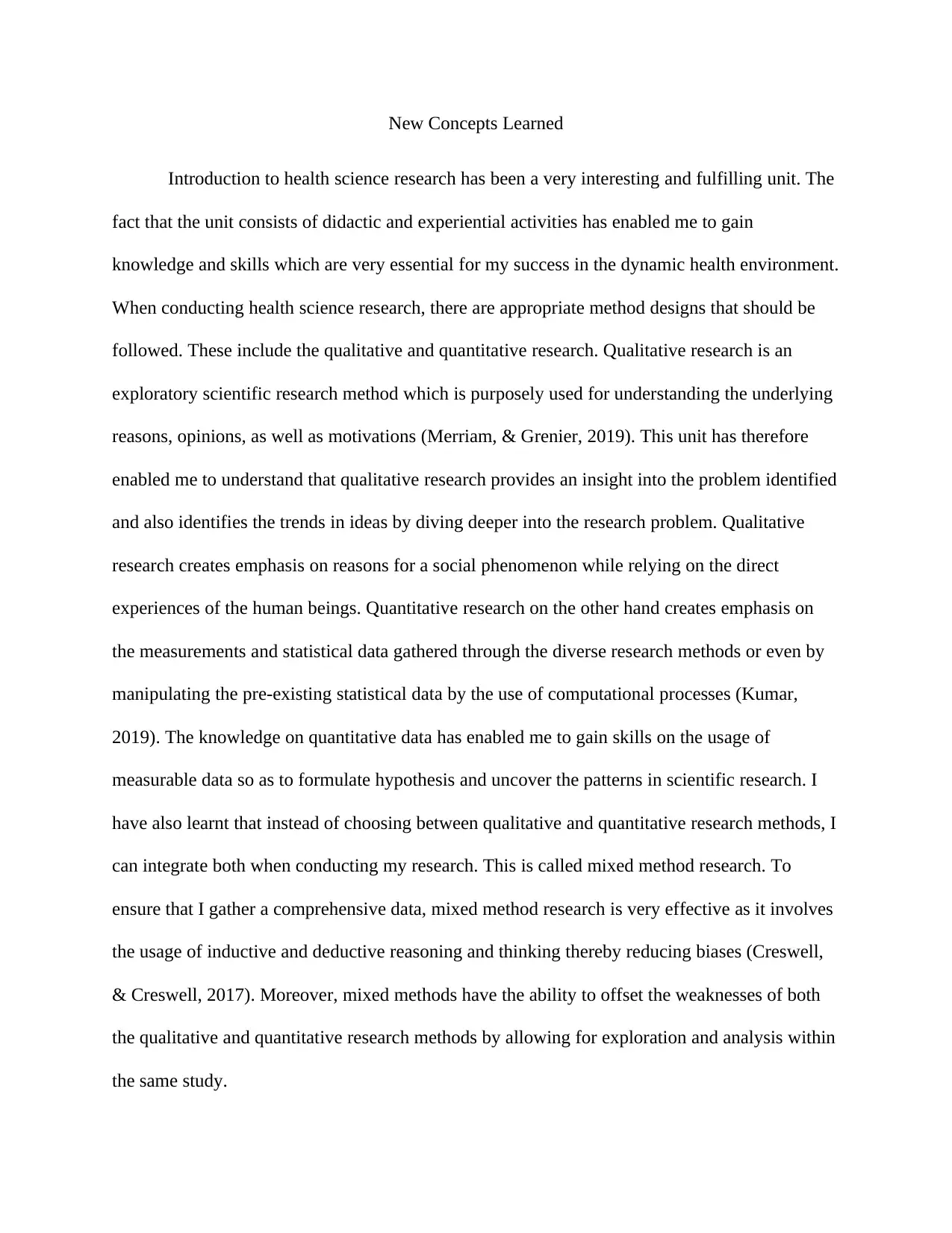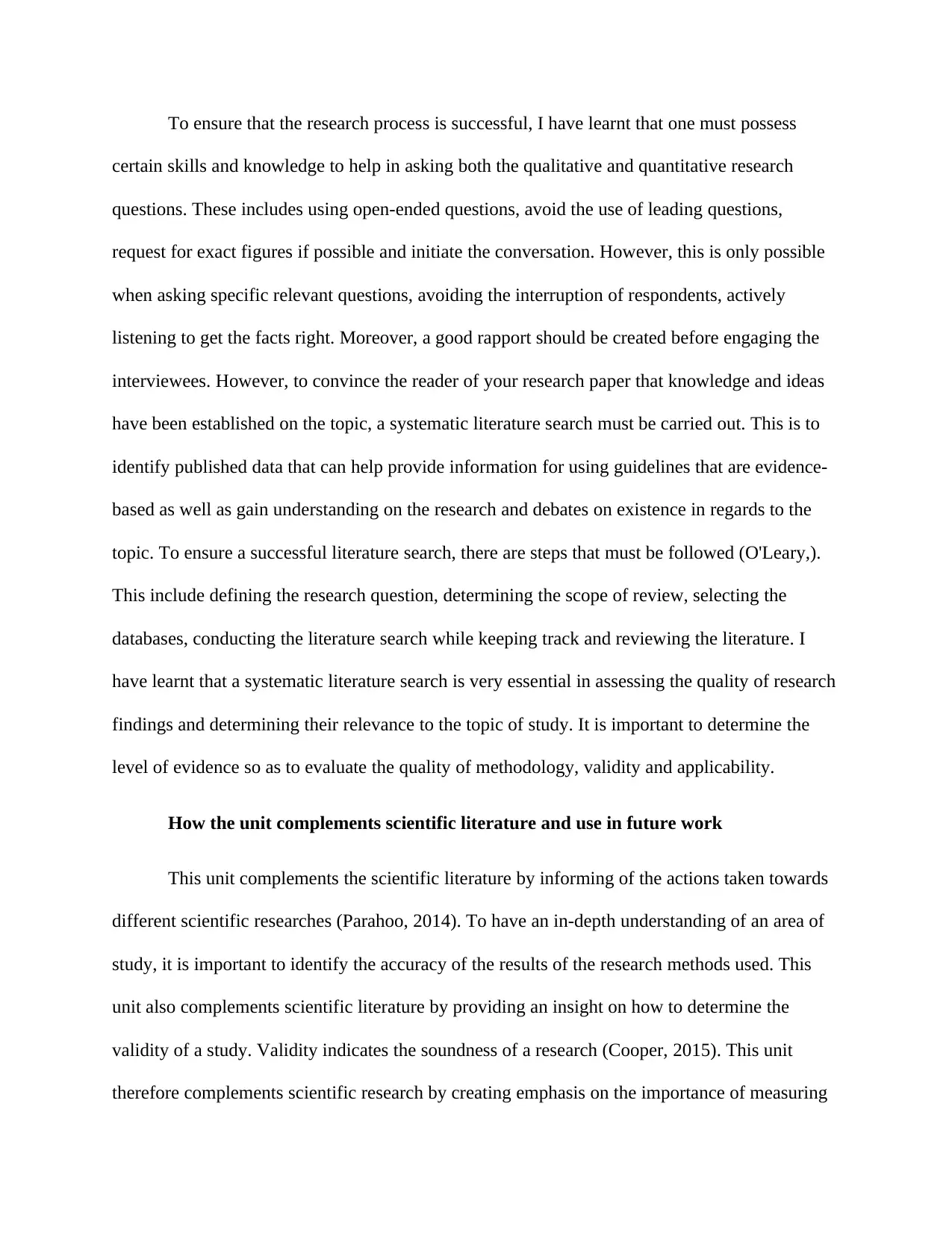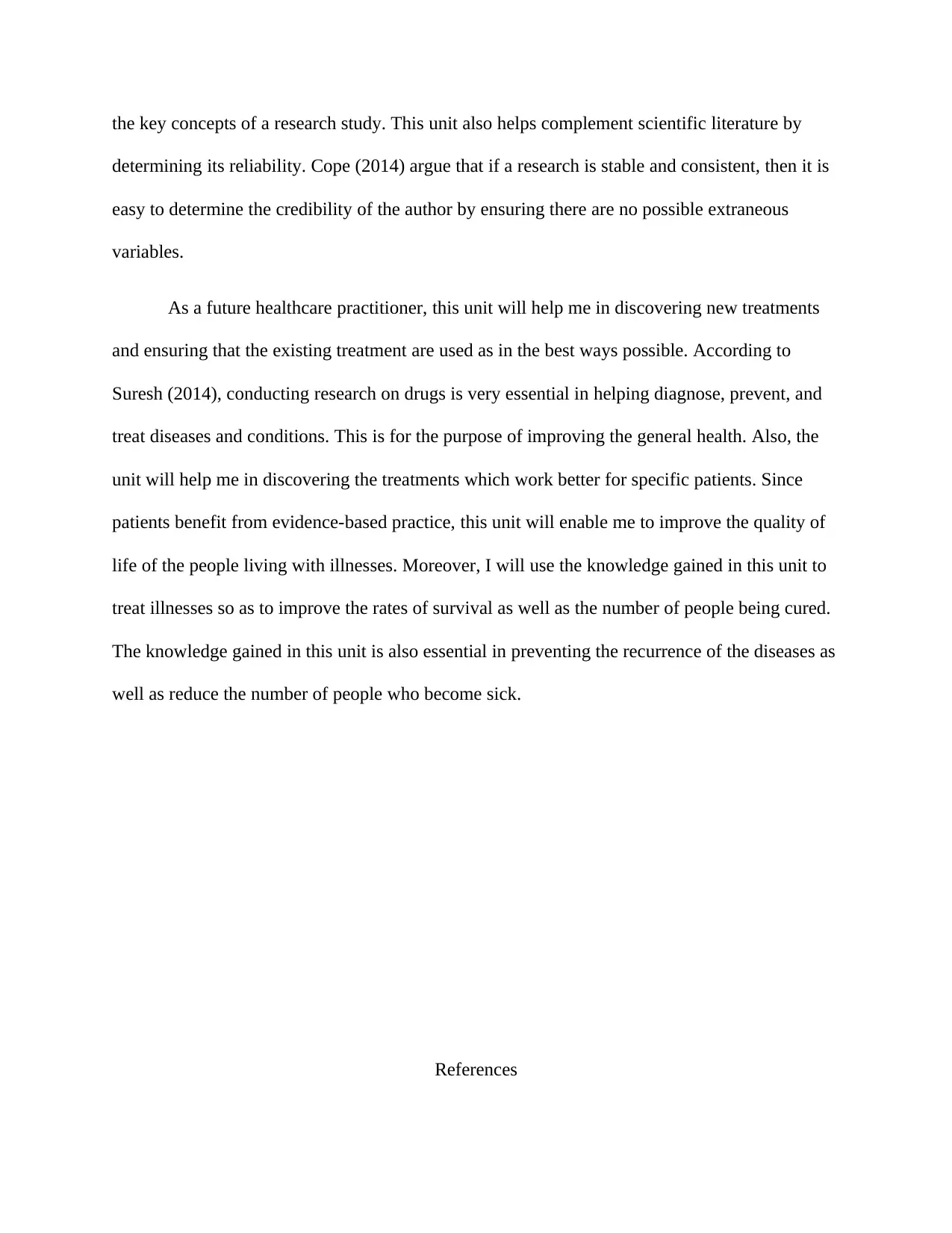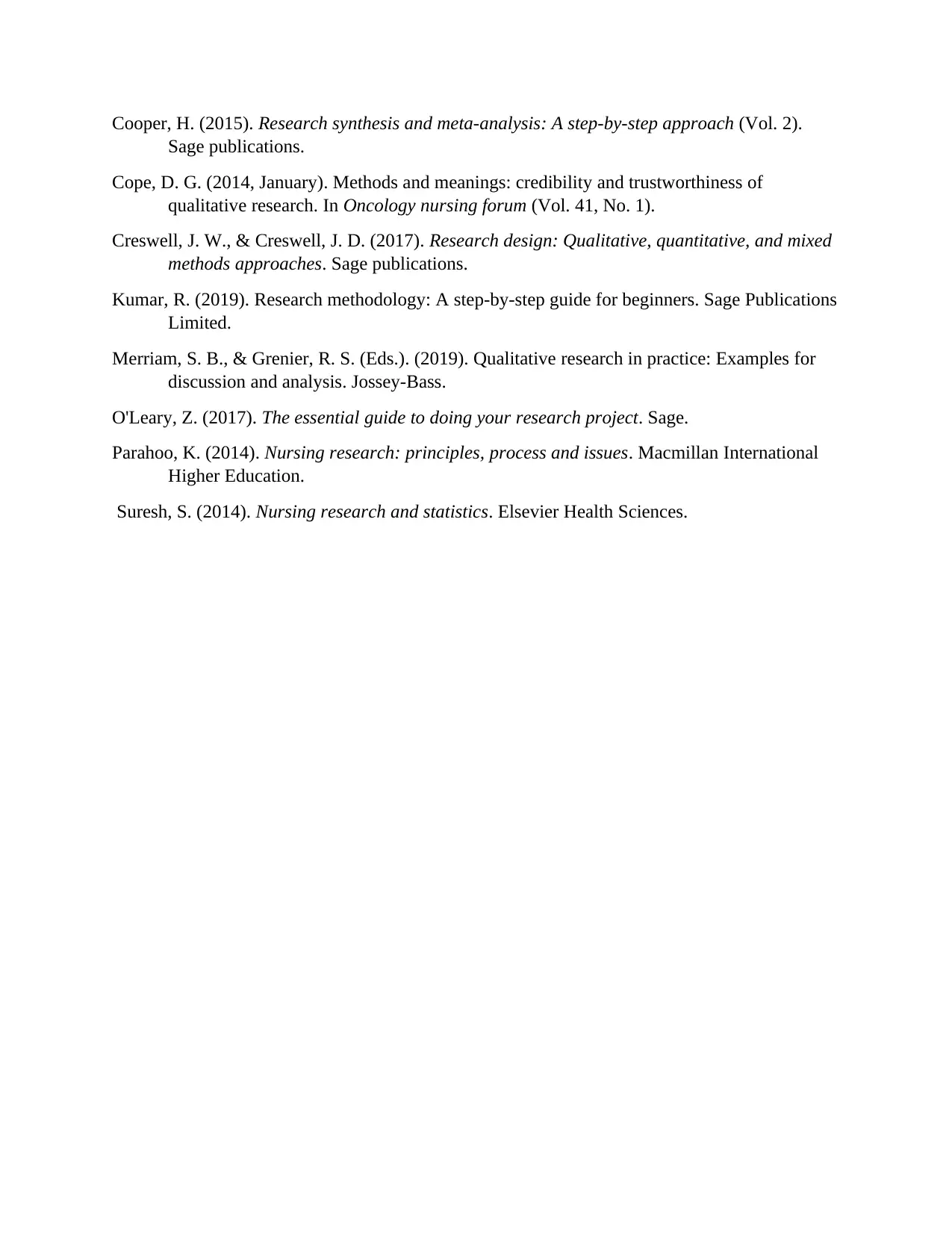HLSC641: Health Science Research - New Concepts Learned in Semester 1
VerifiedAdded on 2022/11/15
|4
|1116
|270
Homework Assignment
AI Summary
This assignment provides a comprehensive overview of key concepts learned in an introductory health science research unit. It explores the distinctions between qualitative, quantitative, and mixed methods research approaches, emphasizing their respective strengths and applications. The assignment highlights the importance of selecting appropriate research methods, formulating research questions, and conducting a systematic literature search. It also discusses the skills required for effective questioning and data collection, including the use of open-ended questions, avoiding leading questions, and active listening. Furthermore, it explains the significance of evidence-based practice and how research findings contribute to advancements in healthcare, including the development of new treatments and improved patient outcomes. The assignment underscores the role of research in informing healthcare practices and improving the quality of life for individuals living with illnesses, as well as preventing disease recurrence.

New Concepts Learned
Introduction to health science research has been a very interesting and fulfilling unit. The
fact that the unit consists of didactic and experiential activities has enabled me to gain
knowledge and skills which are very essential for my success in the dynamic health environment.
When conducting health science research, there are appropriate method designs that should be
followed. These include the qualitative and quantitative research. Qualitative research is an
exploratory scientific research method which is purposely used for understanding the underlying
reasons, opinions, as well as motivations (Merriam, & Grenier, 2019). This unit has therefore
enabled me to understand that qualitative research provides an insight into the problem identified
and also identifies the trends in ideas by diving deeper into the research problem. Qualitative
research creates emphasis on reasons for a social phenomenon while relying on the direct
experiences of the human beings. Quantitative research on the other hand creates emphasis on
the measurements and statistical data gathered through the diverse research methods or even by
manipulating the pre-existing statistical data by the use of computational processes (Kumar,
2019). The knowledge on quantitative data has enabled me to gain skills on the usage of
measurable data so as to formulate hypothesis and uncover the patterns in scientific research. I
have also learnt that instead of choosing between qualitative and quantitative research methods, I
can integrate both when conducting my research. This is called mixed method research. To
ensure that I gather a comprehensive data, mixed method research is very effective as it involves
the usage of inductive and deductive reasoning and thinking thereby reducing biases (Creswell,
& Creswell, 2017). Moreover, mixed methods have the ability to offset the weaknesses of both
the qualitative and quantitative research methods by allowing for exploration and analysis within
the same study.
Introduction to health science research has been a very interesting and fulfilling unit. The
fact that the unit consists of didactic and experiential activities has enabled me to gain
knowledge and skills which are very essential for my success in the dynamic health environment.
When conducting health science research, there are appropriate method designs that should be
followed. These include the qualitative and quantitative research. Qualitative research is an
exploratory scientific research method which is purposely used for understanding the underlying
reasons, opinions, as well as motivations (Merriam, & Grenier, 2019). This unit has therefore
enabled me to understand that qualitative research provides an insight into the problem identified
and also identifies the trends in ideas by diving deeper into the research problem. Qualitative
research creates emphasis on reasons for a social phenomenon while relying on the direct
experiences of the human beings. Quantitative research on the other hand creates emphasis on
the measurements and statistical data gathered through the diverse research methods or even by
manipulating the pre-existing statistical data by the use of computational processes (Kumar,
2019). The knowledge on quantitative data has enabled me to gain skills on the usage of
measurable data so as to formulate hypothesis and uncover the patterns in scientific research. I
have also learnt that instead of choosing between qualitative and quantitative research methods, I
can integrate both when conducting my research. This is called mixed method research. To
ensure that I gather a comprehensive data, mixed method research is very effective as it involves
the usage of inductive and deductive reasoning and thinking thereby reducing biases (Creswell,
& Creswell, 2017). Moreover, mixed methods have the ability to offset the weaknesses of both
the qualitative and quantitative research methods by allowing for exploration and analysis within
the same study.
Paraphrase This Document
Need a fresh take? Get an instant paraphrase of this document with our AI Paraphraser

To ensure that the research process is successful, I have learnt that one must possess
certain skills and knowledge to help in asking both the qualitative and quantitative research
questions. These includes using open-ended questions, avoid the use of leading questions,
request for exact figures if possible and initiate the conversation. However, this is only possible
when asking specific relevant questions, avoiding the interruption of respondents, actively
listening to get the facts right. Moreover, a good rapport should be created before engaging the
interviewees. However, to convince the reader of your research paper that knowledge and ideas
have been established on the topic, a systematic literature search must be carried out. This is to
identify published data that can help provide information for using guidelines that are evidence-
based as well as gain understanding on the research and debates on existence in regards to the
topic. To ensure a successful literature search, there are steps that must be followed (O'Leary,).
This include defining the research question, determining the scope of review, selecting the
databases, conducting the literature search while keeping track and reviewing the literature. I
have learnt that a systematic literature search is very essential in assessing the quality of research
findings and determining their relevance to the topic of study. It is important to determine the
level of evidence so as to evaluate the quality of methodology, validity and applicability.
How the unit complements scientific literature and use in future work
This unit complements the scientific literature by informing of the actions taken towards
different scientific researches (Parahoo, 2014). To have an in-depth understanding of an area of
study, it is important to identify the accuracy of the results of the research methods used. This
unit also complements scientific literature by providing an insight on how to determine the
validity of a study. Validity indicates the soundness of a research (Cooper, 2015). This unit
therefore complements scientific research by creating emphasis on the importance of measuring
certain skills and knowledge to help in asking both the qualitative and quantitative research
questions. These includes using open-ended questions, avoid the use of leading questions,
request for exact figures if possible and initiate the conversation. However, this is only possible
when asking specific relevant questions, avoiding the interruption of respondents, actively
listening to get the facts right. Moreover, a good rapport should be created before engaging the
interviewees. However, to convince the reader of your research paper that knowledge and ideas
have been established on the topic, a systematic literature search must be carried out. This is to
identify published data that can help provide information for using guidelines that are evidence-
based as well as gain understanding on the research and debates on existence in regards to the
topic. To ensure a successful literature search, there are steps that must be followed (O'Leary,).
This include defining the research question, determining the scope of review, selecting the
databases, conducting the literature search while keeping track and reviewing the literature. I
have learnt that a systematic literature search is very essential in assessing the quality of research
findings and determining their relevance to the topic of study. It is important to determine the
level of evidence so as to evaluate the quality of methodology, validity and applicability.
How the unit complements scientific literature and use in future work
This unit complements the scientific literature by informing of the actions taken towards
different scientific researches (Parahoo, 2014). To have an in-depth understanding of an area of
study, it is important to identify the accuracy of the results of the research methods used. This
unit also complements scientific literature by providing an insight on how to determine the
validity of a study. Validity indicates the soundness of a research (Cooper, 2015). This unit
therefore complements scientific research by creating emphasis on the importance of measuring

the key concepts of a research study. This unit also helps complement scientific literature by
determining its reliability. Cope (2014) argue that if a research is stable and consistent, then it is
easy to determine the credibility of the author by ensuring there are no possible extraneous
variables.
As a future healthcare practitioner, this unit will help me in discovering new treatments
and ensuring that the existing treatment are used as in the best ways possible. According to
Suresh (2014), conducting research on drugs is very essential in helping diagnose, prevent, and
treat diseases and conditions. This is for the purpose of improving the general health. Also, the
unit will help me in discovering the treatments which work better for specific patients. Since
patients benefit from evidence-based practice, this unit will enable me to improve the quality of
life of the people living with illnesses. Moreover, I will use the knowledge gained in this unit to
treat illnesses so as to improve the rates of survival as well as the number of people being cured.
The knowledge gained in this unit is also essential in preventing the recurrence of the diseases as
well as reduce the number of people who become sick.
References
determining its reliability. Cope (2014) argue that if a research is stable and consistent, then it is
easy to determine the credibility of the author by ensuring there are no possible extraneous
variables.
As a future healthcare practitioner, this unit will help me in discovering new treatments
and ensuring that the existing treatment are used as in the best ways possible. According to
Suresh (2014), conducting research on drugs is very essential in helping diagnose, prevent, and
treat diseases and conditions. This is for the purpose of improving the general health. Also, the
unit will help me in discovering the treatments which work better for specific patients. Since
patients benefit from evidence-based practice, this unit will enable me to improve the quality of
life of the people living with illnesses. Moreover, I will use the knowledge gained in this unit to
treat illnesses so as to improve the rates of survival as well as the number of people being cured.
The knowledge gained in this unit is also essential in preventing the recurrence of the diseases as
well as reduce the number of people who become sick.
References
⊘ This is a preview!⊘
Do you want full access?
Subscribe today to unlock all pages.

Trusted by 1+ million students worldwide

Cooper, H. (2015). Research synthesis and meta-analysis: A step-by-step approach (Vol. 2).
Sage publications.
Cope, D. G. (2014, January). Methods and meanings: credibility and trustworthiness of
qualitative research. In Oncology nursing forum (Vol. 41, No. 1).
Creswell, J. W., & Creswell, J. D. (2017). Research design: Qualitative, quantitative, and mixed
methods approaches. Sage publications.
Kumar, R. (2019). Research methodology: A step-by-step guide for beginners. Sage Publications
Limited.
Merriam, S. B., & Grenier, R. S. (Eds.). (2019). Qualitative research in practice: Examples for
discussion and analysis. Jossey-Bass.
O'Leary, Z. (2017). The essential guide to doing your research project. Sage.
Parahoo, K. (2014). Nursing research: principles, process and issues. Macmillan International
Higher Education.
Suresh, S. (2014). Nursing research and statistics. Elsevier Health Sciences.
Sage publications.
Cope, D. G. (2014, January). Methods and meanings: credibility and trustworthiness of
qualitative research. In Oncology nursing forum (Vol. 41, No. 1).
Creswell, J. W., & Creswell, J. D. (2017). Research design: Qualitative, quantitative, and mixed
methods approaches. Sage publications.
Kumar, R. (2019). Research methodology: A step-by-step guide for beginners. Sage Publications
Limited.
Merriam, S. B., & Grenier, R. S. (Eds.). (2019). Qualitative research in practice: Examples for
discussion and analysis. Jossey-Bass.
O'Leary, Z. (2017). The essential guide to doing your research project. Sage.
Parahoo, K. (2014). Nursing research: principles, process and issues. Macmillan International
Higher Education.
Suresh, S. (2014). Nursing research and statistics. Elsevier Health Sciences.
1 out of 4
Related Documents
Your All-in-One AI-Powered Toolkit for Academic Success.
+13062052269
info@desklib.com
Available 24*7 on WhatsApp / Email
![[object Object]](/_next/static/media/star-bottom.7253800d.svg)
Unlock your academic potential
Copyright © 2020–2026 A2Z Services. All Rights Reserved. Developed and managed by ZUCOL.





